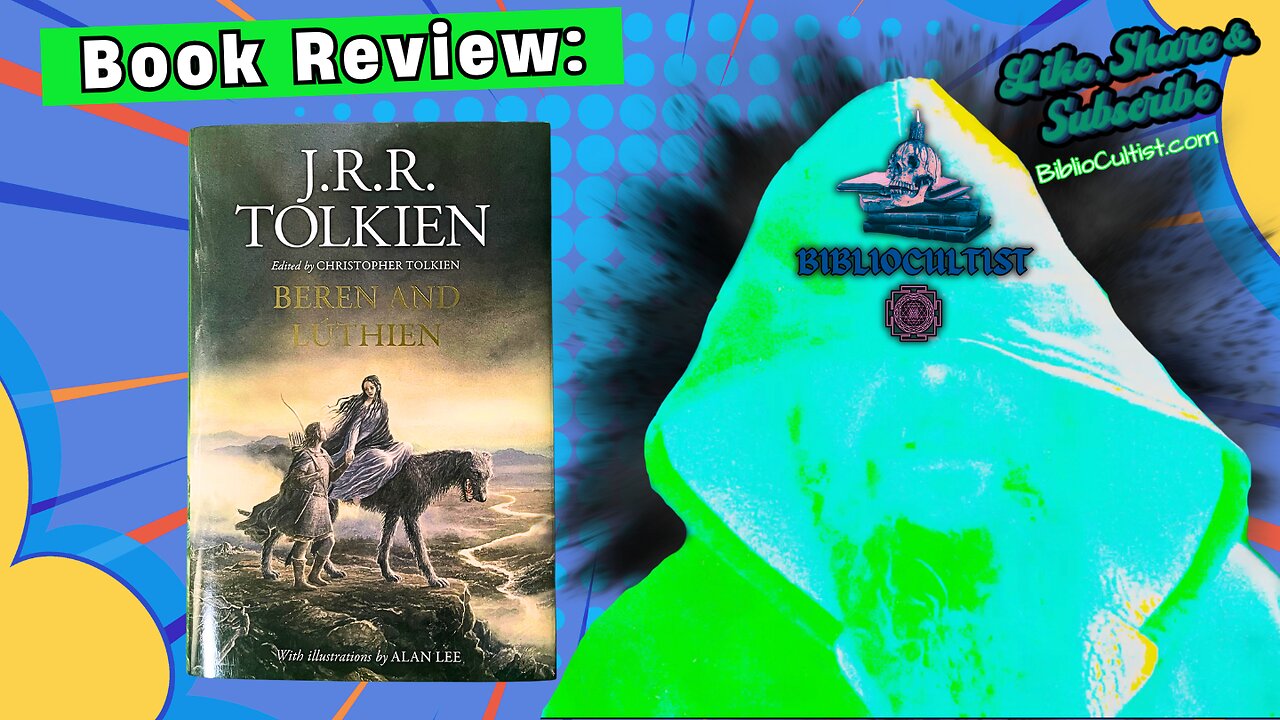Premium Only Content

Tolkien Legendarium's DIVINE Romance
*CHECK OUT MY MERCH: https://bibliocultist.printful.me/*
In this video, I explore J.R.R. Tolkien's captivating tale of 'Beren and Luthien', a profound love story woven into the rich tapestry of his legendary Silmarillion mythology. I delve into Tolkien's masterful ability to elevate familiar fairy tale elements into something transcendent, imbuing them with theological depth, ethereal beauty, and an enchanting sense of magic. The earliest version, 'The Tale of Tinuviel', holds a special place for me, with Beren portrayed as an elf rather than a human, adding an intriguing layer to the narrative. We journey through the mystical realms inhabited by the enigmatic Luthien, the mesmerizing dancer, and confront the looming threat of Morgoth/Melkor, the primary antagonist, and his lieutenant Tevildo/Sauron. I also appreciate Christopher Tolkien's scholarly approach in compiling and presenting his father's extensive notes and drafts, allowing us to trace the evolution of this captivating story. Ultimately, 'Beren and Luthien' stands as a breathtaking addition to Tolkien's legendarium, a tale of love, sacrifice, and the enduring power of hope in the face of darkness.
*all music and content copyright BiblioCultist.com*
#Melkor #Morgoth #Tolkien #Silmarillion #DarkLord #MiddleEarth #Ainur #Legendarium #FantasyVillains #Arda #TolkienMythology #FirstDarkLord #EpicFantasy #TolkienLegacy #booktube #books #biblio #cultist
**SHOW NOTES**
1. J.R.R. Tolkien (1892–1973) was a British scholar of medieval literature and author of The Hobbit and The Lord of the Rings. A pioneer of modern fantasy, he revolutionized fairy tales and myth by treating them not as childish stories but as serious, immersive world-building. His works (The Silmarillion, Legendarium) blended Norse, Celtic, and Christian myths into a unified cosmology, inspiring generations to see fantasy as a vehicle for truth, moral depth, and linguistic artistry. His legacy redefined myth-making for the 20th century and beyond.
2. Christopher Tolkien (1924–2020) was the youngest son of J.R.R. Tolkien and the architect of Middle-earth’s legacy. As his father’s literary executor, he devoted 50+ years to editing and publishing unfinished works like The Silmarillion, Unfinished Tales, and the 12-volume History of Middle-earth—transforming fragmented manuscripts into a cohesive mythological canon. A WWII RAF pilot and Oxford scholar, his meticulous scholarship preserved the depth of Tolkien’s world, ensuring its status as the benchmark of modern fantasy world-building.
3. The fairy tale as a genre originated in oral folk traditions, evolving over centuries to blend myth, moral instruction, and communal storytelling. Rooted in ancient animist beliefs and medieval folklore (e.g., Aesop’s fables, The Thousand and One Nights), the modern fairy tale crystallized in 17th–18th century Europe through collectors like Charles Perrault (Cinderella) and the Brothers Grimm (Snow White). These tales—often sanitized for children—retain archetypal structures (quests, trials, magical helpers) that reflect universal human anxieties and desires. Tolkien argued in "On Fairy-Stories" that their power lies not in escapism, but in offering "a sudden glimpse of the underlying reality"—truths too profound for literal language. From oral campfires to Disney’s empire, fairy tales remain the subconscious grammar of culture.
4. Melkor (later called Morgoth) was the mightiest of the Ainur, primordial spirits created by Eru Ilúvatar in Tolkien’s legendarium. Initially a divine being of boundless creativity, he rebelled out of pride, seeking to impose his own will upon the Music of the Ainur—the cosmic blueprint of Arda. Corrupted by this defiance, he became the first Dark Lord, twisting creation into monstrous forms (dragons, orcs) and plunging Middle-earth into epochs of war. His fall mirrors Lucifer’s but is distinctively Tolkienian: a godlike entity who "would subdue to his will both Elves and Men" (The Silmarillion), turning his divine gifts into tools of domination. Unlike Sauron (his lieutenant), Melkor’s evil was ontological—a perversion of the world’s very fabric.
-
 LIVE
LIVE
VINCE
1 hour agoThe Left's "Mostly Peaceful" Terrorists + Guest Eric Trump | Episode 135 - 09/29/25
40,891 watching -
 LIVE
LIVE
Bannons War Room
7 months agoWarRoom Live
13,430 watching -
 LIVE
LIVE
Benny Johnson
57 minutes agoChristianity Under Attack: Trump Declares 'Epidemic of Violence' on Christians As Church Shot,Burned
5,401 watching -
 LIVE
LIVE
Nikko Ortiz
35 minutes agoChurch Shooting And Arson Attack In Michigan - Rumble LIVE
244 watching -
 LIVE
LIVE
LadyDesireeMusic
14 minutes agoLive Piano & Convo | Support a Culture Change | Make Ladies Great Again
62 watching -
 35:58
35:58
Mike Rowe
3 days agoWhat About Jimmy Kimmel? | Hot Takes
9.37K33 -
 LIVE
LIVE
LumpyPotatoX2
1 hour agoDestiny Rising: Gameplay + Industry Talks - #RumbleGaming
38 watching -
 LIVE
LIVE
Badlands Media
8 hours agoBadlands Daily: September 29, 2025
3,849 watching -
 1:40:46
1:40:46
Dear America
2 hours agoThe War Is On!!! ICE Invades Chicago And Portland! DEPORT THEM ALL!!
107K86 -
 LIVE
LIVE
Matt Kohrs
10 hours agoStock Market Open: NEW HIGHS INCOMING?! || Live Trading Futures & Options
602 watching